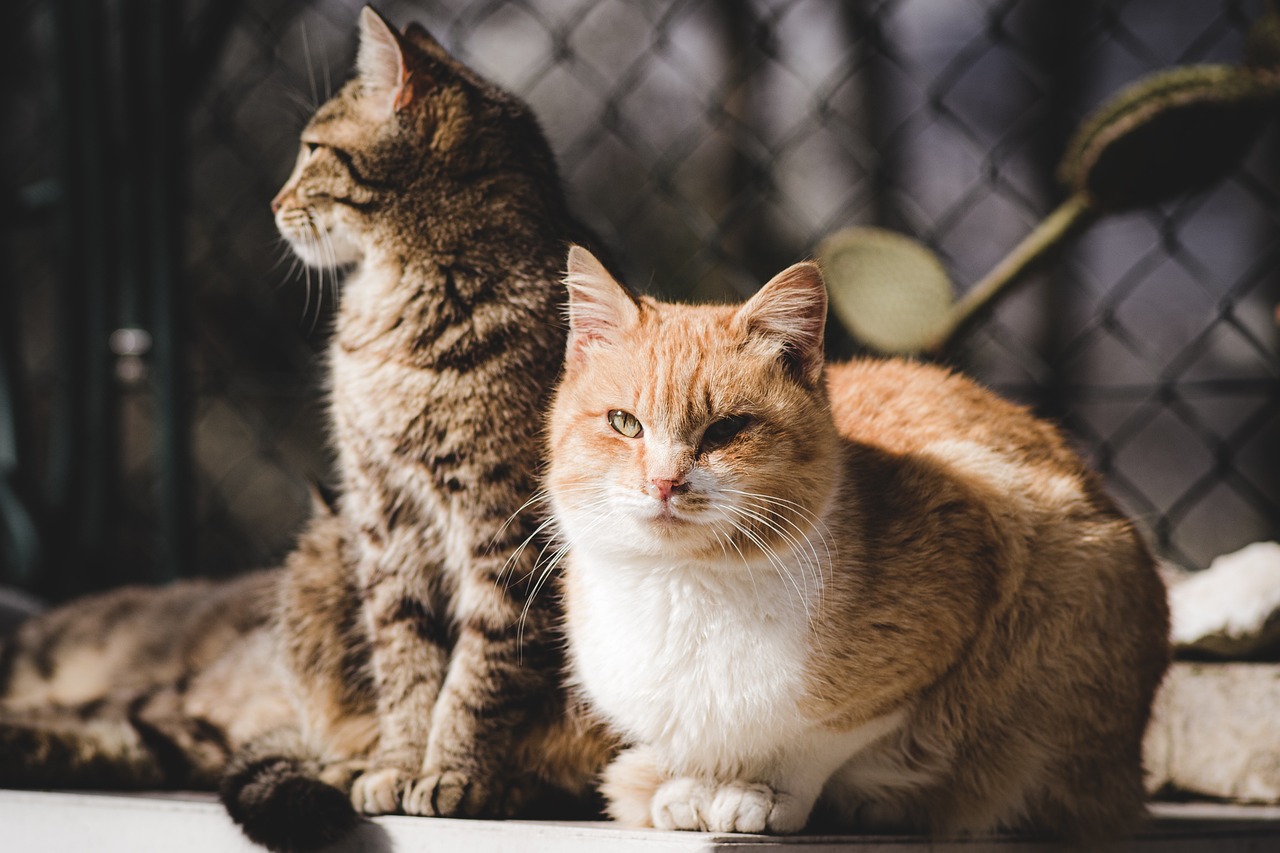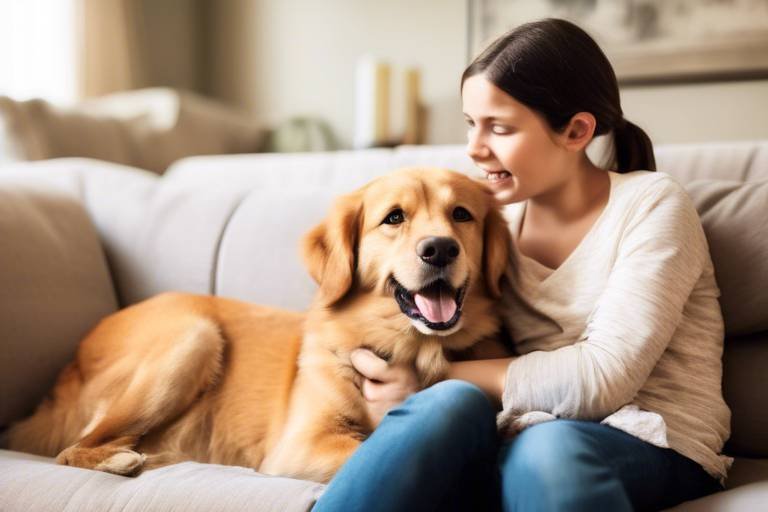The Emotional Rewards of Adopting a Pet
Adopting a pet is not just about bringing a furry friend into your home; it's about opening the door to a world filled with unconditional love, joy, and emotional fulfillment. Imagine coming home after a long day, only to be greeted by a wagging tail or a gentle purr. Pets have an incredible ability to lift our spirits and provide companionship that is hard to find elsewhere. They become part of our families, offering a unique bond that enriches our lives in countless ways.
The emotional rewards of pet adoption stretch far beyond mere companionship. Studies have shown that pets can significantly reduce feelings of loneliness and isolation, especially in today’s fast-paced world where many people feel disconnected. When you adopt a pet, you’re not only gaining a friend; you’re also investing in your own mental health. The simple act of petting a dog or cat can release oxytocin, the “feel-good” hormone, which promotes feelings of happiness and relaxation. This biological response is akin to the warmth you feel when hugging a loved one, making pets invaluable partners in our daily lives.
One of the most profound emotional benefits of adopting a pet is the companionship they offer. Pets have an uncanny ability to sense our emotions and provide comfort during tough times. Whether you’re feeling down or just need someone to share your day with, your pet is always there, ready to listen without judgment. This unwavering support can be a game-changer, especially for those battling anxiety or depression. Pets remind us that we are never truly alone, and their presence can significantly enhance our emotional well-being.
In addition to companionship, pets play a crucial role in reducing stress and improving mental health. Interacting with animals has been shown to lower cortisol levels, the hormone associated with stress. Just think about it: after a stressful day, spending time with your pet can feel like a warm blanket wrapping around you. The rhythmic motion of petting an animal can be incredibly soothing, allowing us to unwind and reconnect with ourselves. This simple act creates a moment of peace in our hectic lives, proving that sometimes, the best therapy comes with four legs and a wagging tail.
For many individuals, pets serve as essential emotional support. They provide a sense of purpose and responsibility that can be incredibly grounding during difficult times. When life throws challenges our way, the unconditional love from a pet can be a powerful tool for coping. Just like a loyal friend, pets are always there to comfort us, whether it’s through their playful antics or their calming presence. This bond can lead to a sense of fulfillment that enhances our overall quality of life.
Engaging in activities with pets, such as walking, playing, or even training, fosters a strong bond that goes beyond just sharing a living space. These shared experiences create lasting memories and deepen the emotional connection between pets and their owners. Imagine the joy of watching your dog learn a new trick or the peaceful moments spent cuddling with your cat after a long day. These activities not only enhance the quality of life for pets but also promote emotional well-being for their owners.
Having a pet also creates a daily routine, which can be incredibly beneficial for mental health. The responsibility of caring for an animal encourages structure and stability in one’s life. Just like a morning cup of coffee or a nightly ritual, the routine of feeding, walking, and playing with a pet can provide a sense of normalcy and predictability. This structure can be particularly helpful for those struggling with mental health issues, as it instills a sense of purpose and accomplishment.
Owning a pet often leads to increased social interactions. Pets can serve as great conversation starters, making it easier to connect with others. Whether it’s chatting with fellow dog owners at the park or bonding with friends over shared pet stories, these interactions can help pet owners build new friendships and strengthen existing relationships. The joy of sharing pet-related experiences can create a sense of community that enhances our social lives.
While pets offer numerous emotional rewards, it’s essential to acknowledge that they also require a significant commitment. Understanding the responsibilities of pet ownership is crucial for ensuring a positive experience for both the pet and the owner. It's not just about the joy they bring; it’s also about the time, effort, and resources needed to care for them properly. Before adopting, potential pet owners should consider their lifestyle and whether they can provide a stable and loving environment.
Pet ownership demands both time and financial resources. From food and veterinary care to grooming and training, the costs can add up. Prospective pet owners should assess their ability to meet these requirements to ensure they can provide the best care possible. It’s vital to remember that adopting a pet is a long-term commitment, and understanding these responsibilities can lead to a more fulfilling experience for both parties.
The emotional rewards of adopting a pet extend beyond the immediate benefits. Over time, the bond formed with a pet can lead to lasting happiness and fulfillment. The laughter, love, and companionship that pets provide can enrich our lives in ways we never imagined. Just like a fine wine, the relationship with a pet gets better with time, bringing joy and comfort to both pets and their owners.
- What are the emotional benefits of having a pet? Pets provide companionship, reduce stress, and improve overall mental health.
- How do pets help with loneliness? Pets offer unconditional love and companionship, making individuals feel less isolated.
- What responsibilities come with pet ownership? Pet ownership requires time, financial resources, and a commitment to care for the animal.
- Can pets improve social interactions? Yes, pets can serve as conversation starters and help owners build social connections.

The Companionship Factor
There's something truly special about the bond between humans and their pets. Imagine coming home after a long, exhausting day, and there, waiting for you at the door, is your furry friend, tail wagging and eyes sparkling with excitement. This unwavering companionship that pets offer can significantly alleviate feelings of loneliness and isolation. It's like having a loyal friend who is always there to listen, comfort, and make you smile, even on your toughest days. The presence of a pet can transform a mundane routine into a vibrant and fulfilling experience.
Pets have an incredible way of enhancing our emotional well-being. They don’t just exist in our homes; they become integral members of our families. For many people, especially those living alone, pets provide an essential source of companionship. The simple act of cuddling with a pet can release oxytocin, often referred to as the "love hormone," which promotes feelings of happiness and connection. This is why people often say that pets are not just animals; they are family.
Think about it: when you're feeling down, who is often right there beside you, ready to offer comfort? Your pet! Whether it's a dog snuggling up next to you or a cat purring contentedly in your lap, these moments of connection can be incredibly healing. The emotional support that pets provide is not just a bonus; it's a lifeline for many. In fact, studies have shown that pet owners often report feeling less stressed and more content in their lives.
Moreover, pets encourage us to engage in activities that foster bonding. Whether it's taking a dog for a walk, playing fetch, or simply sitting together in the sun, these shared experiences can deepen the emotional connection between pet and owner. It's a beautiful cycle: the more time we spend with our pets, the more we appreciate their presence, and in turn, they thrive on our attention and affection.
In addition to companionship, having a pet introduces a sense of routine into our lives. The responsibility of caring for an animal—feeding, grooming, and exercising—creates a structured environment that can be incredibly beneficial for mental health. This routine not only helps in keeping us grounded but also provides a sense of purpose. Just like how a gardener finds joy in nurturing their plants, pet owners find fulfillment in caring for their furry friends.
To summarize, the companionship factor of pet ownership is profound. It’s about more than just having a pet; it’s about building a relationship that enriches our lives in countless ways. From the joy of their presence to the emotional support they provide, pets truly have a remarkable impact on our emotional well-being. So, if you're contemplating adopting a pet, remember that you’re not just gaining an animal; you’re inviting a loyal companion into your life.

When it comes to managing stress and enhancing mental health, pets can be our unsung heroes. Numerous studies have demonstrated that simply interacting with animals can lead to a significant drop in stress levels. Imagine coming home after a long, exhausting day, and there at the door is your furry friend, tail wagging and ready to greet you. This simple act of connection can trigger a cascade of positive emotions. The mere act of petting a dog or cat releases oxytocin, often referred to as the "love hormone," which fosters feelings of happiness and relaxation.
But it's not just about the physical act of petting; the emotional bond we share with our pets plays a crucial role in our mental well-being. Pets offer a non-judgmental presence, allowing us to express our feelings freely. When we're feeling down, they seem to sense it and often come to cuddle or sit close by, providing comfort without needing to say a word. This kind of emotional support can be incredibly powerful, especially during tough times.
Moreover, the routine of caring for a pet can instill a sense of purpose. For many, the responsibility that comes with pet ownership can be a grounding force. Having a pet means you have someone who depends on you, which can help combat feelings of worthlessness that often accompany anxiety and depression. The daily tasks of feeding, walking, and playing with a pet can create a structure that promotes stability in our lives.
In fact, let’s consider some of the specific mental health benefits that pets provide:
- Lowered Anxiety: The act of petting a dog or cat has been shown to reduce levels of anxiety significantly.
- Improved Mood: Interacting with pets can increase serotonin and dopamine levels, neurotransmitters that enhance mood.
- Enhanced Social Interaction: Pets can serve as social catalysts, making it easier to meet new people and engage in conversations.
To put it simply, pets have a unique way of bringing joy into our lives and reducing the burdens of stress. They encourage us to live in the moment, reminding us that happiness can often be found in the simplest of interactions. Just think about how a playful puppy can make you laugh or how a cat's purr can soothe you after a stressful day. These moments create a tapestry of emotional well-being that enriches our lives.
In conclusion, the emotional rewards of owning a pet are profound and multifaceted. They not only help us manage stress but also improve our overall mental health. So, if you're considering adopting a pet, know that you're not just gaining a companion; you're also investing in a happier, healthier you.
- How do pets help reduce stress? Pets provide companionship, encourage physical activity, and offer unconditional love, all of which contribute to lower stress levels.
- Can pets really improve mental health? Yes, pets can help alleviate symptoms of anxiety and depression by providing emotional support and companionship.
- What type of pet is best for mental health? Dogs and cats are commonly recommended, but the best pet for you depends on your lifestyle and preferences.
When life throws curveballs, it’s often our furry friends who help us catch them. Pets have an incredible ability to provide emotional support, acting as a comforting presence during tough times. Imagine coming home after a long, stressful day; the moment you walk through the door, your dog greets you with a wagging tail and a joyful bark. It’s as if they can sense your emotions, ready to lift your spirits. This deep connection can be a game-changer for many individuals, especially those dealing with anxiety, depression, or loneliness.
Research has shown that just being around pets can significantly reduce feelings of stress and anxiety. When you pet a dog or cuddle with a cat, your body releases oxytocin, often referred to as the "love hormone." This chemical reaction not only promotes feelings of happiness but also reduces cortisol levels, the hormone linked to stress. It's like having a built-in therapist who never judges you and is always ready to listen without saying a word. The unconditional love pets provide can be a powerful tool for coping with life’s challenges, making them invaluable companions.
In addition to their presence, pets encourage us to engage in activities that can further enhance our emotional well-being. Whether it’s taking a brisk walk with your dog or simply playing with your cat, these interactions foster a sense of purpose and belonging. Pets remind us that we are never truly alone, even in our darkest moments. They have an innate ability to sense our feelings, offering comfort and companionship when we need it most.
Many people find that sharing their lives with pets helps them develop better coping mechanisms. For instance, those who struggle with social anxiety often feel more at ease when accompanied by their pets. They can act as social facilitators, allowing their owners to connect with others more easily. Imagine walking your dog in the park and striking up a conversation with another dog owner; suddenly, you’re not just a solitary figure but part of a community. This social interaction can significantly reduce feelings of isolation and loneliness.
In summary, pets serve as emotional anchors in our lives. They provide unwavering support, enhance our mood, and help us navigate through the ups and downs of life. Their ability to offer comfort and companionship is unparalleled, making them essential partners in our emotional journeys. So, if you’re considering adopting a pet, remember that you’re not just gaining a companion; you’re inviting a source of unconditional love and emotional support into your life.
- How can pets help with anxiety?
Pets provide companionship and reduce stress levels through physical touch and interaction, which can alleviate feelings of anxiety.
- What types of pets are best for emotional support?
While dogs and cats are the most common emotional support animals, other pets like rabbits, birds, and even guinea pigs can also provide comfort.
- Do I need a special certification for my pet to be an emotional support animal?
No formal certification is required, but a letter from a mental health professional can help in certain situations.
- Can having a pet really improve my mental health?
Yes, studies have shown that pet ownership can lead to lower levels of stress, decreased feelings of loneliness, and improved overall mood.
Engaging in activities with your pet is not just a fun way to pass the time; it's a vital aspect of building a deep and meaningful bond. Think about it: when you walk your dog or play fetch in the backyard, you’re not just exercising your furry friend; you’re also creating shared memories that strengthen your connection. These moments are like threads woven into the fabric of your relationship, each one adding durability and richness to the tapestry of your life together.
Consider the joy of exploring nature with your pet. Whether it’s a hike through the woods or a leisurely stroll in the park, these experiences allow both you and your pet to discover new sights, sounds, and smells. The excitement of a new environment can lead to playful interactions, and nothing beats the sight of your pet’s tail wagging in pure delight. This shared exploration fosters a sense of adventure and companionship that can be incredibly rewarding.
Moreover, activities like training sessions can also be a fantastic bonding experience. Not only do they help to instill discipline and good behavior, but they also encourage communication and understanding between you and your pet. The process of teaching your pet new tricks or commands can be filled with laughter and joy, reinforcing your emotional connection. Remember, every time your pet successfully follows a command, it’s a little victory for both of you!
Here are some popular activities that can enhance your bond with your pet:
- Walking or Hiking: Regular walks not only keep your pet fit but also provide opportunities for exploration and socialization.
- Playing Games: Games like fetch, tug-of-war, or hide-and-seek can be thrilling for pets and owners alike.
- Training Sessions: Teaching your pet new tricks or commands fosters communication and strengthens your bond.
- Participating in Pet Classes: Join classes like agility or obedience training to learn together and build teamwork.
In essence, the activities you share with your pet are more than just pastimes; they are the building blocks of a strong relationship. By investing time in these shared experiences, you not only enhance your pet’s happiness and well-being but also enrich your own life. After all, isn’t that what pet ownership is all about? The joy of companionship, the laughter shared, and the love that grows with every moment spent together?
- What activities can I do with my pet to strengthen our bond?
Engaging in walks, playtime, training sessions, and even exploring new environments together can significantly strengthen your bond.
- How does spending time with my pet improve my mental health?
Activities with pets can reduce stress, promote happiness, and create a sense of purpose, all of which contribute to better mental health.
- Can pets help with loneliness?
Yes! Pets provide companionship and unconditional love, helping to alleviate feelings of loneliness and isolation.
Having a pet in your life can significantly transform your daily routine into something more structured and fulfilling. Imagine waking up each morning to the sound of your furry friend eagerly waiting for breakfast, wagging their tail or purring softly. This daily ritual not only provides a sense of purpose but also instills a rhythm to your day that can be incredibly grounding. Pets thrive on routine, and in turn, they encourage their owners to establish healthy habits that contribute to overall well-being.
For instance, the simple act of taking your dog for a morning walk can serve as a catalyst for a more active lifestyle. Not only are you getting exercise, but you’re also setting the tone for a productive day ahead. Similarly, feeding your pet at the same time each day can help you develop a consistent meal schedule for yourself, promoting better eating habits. It's like having a built-in accountability partner who nudges you towards healthier choices!
Moreover, routines can enhance the emotional bond between you and your pet. When you engage in regular activities together, such as playing fetch, grooming, or even snuggling on the couch, you’re not just passing the time; you’re creating lasting memories. These shared moments can foster a sense of security and trust, making your relationship with your pet even more profound.
To illustrate the importance of routine in pet ownership, consider the following table that outlines some daily activities and their emotional benefits:
| Activity | Emotional Benefits |
|---|---|
| Morning Walk | Boosts mood, increases energy levels |
| Feeding Time | Creates a sense of responsibility and care |
| Playtime | Enhances joy and strengthens emotional bonds |
| Evening Cuddles | Promotes relaxation and reduces anxiety |
Establishing a routine with your pet can also provide a sense of stability during chaotic times. Life can be unpredictable, but knowing that your pet relies on you for their needs can be a comforting anchor. This consistency can be especially beneficial during stressful periods, as it encourages you to focus on the present moment rather than getting lost in worries. In essence, your pet becomes not just a companion but a source of emotional support, guiding you towards a more balanced and fulfilling life.
- How can a pet improve my daily routine? Pets encourage regular activities, like walks and feeding times, which can help you establish a more structured day.
- What are the emotional benefits of having a pet? Pets provide companionship, reduce stress, and enhance overall emotional well-being.
- Can pets help during tough times? Yes, pets offer unconditional love and support, making it easier to cope with life's challenges.
- What responsibilities come with pet ownership? Pet ownership requires time, financial investment, and a commitment to care for your pet's needs.
Owning a pet can be a gateway to a vibrant social life, transforming the way we connect with others. Imagine walking your dog in the park; it’s not just about the exercise or the fresh air; it’s about the conversations that blossom as fellow dog owners stop to chat. Pets act as social catalysts, breaking down barriers and sparking friendships. They can turn a mundane stroll into a lively exchange of stories, tips, and laughter.
Moreover, the presence of a pet can create a sense of community. Whether you’re attending a local pet event or simply hanging out at a pet-friendly café, the shared love for animals often leads to deeper connections. People are naturally drawn to those who share similar interests, and what better common ground than the unconditional love for a furry friend? This bonding over pets can lead to lasting friendships, enriching our social lives in ways we might not have anticipated.
Additionally, pets can help ease social anxiety. For those who may struggle to initiate conversations or feel shy in social settings, having a pet provides an instant icebreaker. “Oh, what breed is your dog?” or “How old is your cat?” are simple questions that can kickstart a meaningful dialogue. These small interactions can build confidence and encourage pet owners to engage more with their communities.
Furthermore, pet ownership can enhance family connections. For families with children, pets can teach valuable lessons about responsibility, empathy, and teamwork. Engaging in activities like feeding, grooming, or training a pet fosters cooperation and communication among family members. This shared experience not only strengthens family bonds but also creates a nurturing environment where everyone feels valued and connected.
In essence, the social benefits of having a pet are multifaceted. They not only enrich our lives but also help us forge new relationships, strengthen existing ones, and create a sense of belonging. So, if you’re considering adopting a pet, remember that you’re not just gaining a companion; you’re also opening the door to a broader social network.
- How can pets improve my social life?
Pets can serve as conversation starters and help you meet new people, especially in pet-friendly environments. - What types of pets are best for socializing?
Dogs are often the most social pets, but cats and other animals can also foster connections through shared interests. - Can pets help with social anxiety?
Yes, pets can provide comfort and serve as icebreakers in social situations, making it easier to interact with others. - How do pets strengthen family bonds?
Taking care of a pet together teaches teamwork and responsibility, enhancing communication and connection among family members.

Adopting a pet is not just about the joy and companionship they bring; it also involves a significant level of responsibility and commitment. When you bring a furry friend into your home, you are essentially taking on the role of their caregiver, which means providing for their physical, emotional, and social needs. This commitment can be as profound as it is rewarding, and it’s essential to understand what you’re signing up for before making that leap. Are you ready for a long-term relationship that requires time, effort, and love?
One of the first things to consider is the time investment. Pets thrive on attention and interaction, and they require daily care. From feeding and grooming to exercise and playtime, your schedule will need to accommodate these activities. For instance, dogs typically need at least an hour of exercise each day, while cats require less but still benefit from interactive play. If you’re someone who travels frequently or works long hours, it’s crucial to think about how you will meet your pet’s needs. Will you hire a dog walker or have a friend check in on your cat? Planning ahead can ensure that your pet remains happy and healthy.
In addition to time, there’s also a significant financial commitment involved in pet ownership. The costs can add up quickly, including food, veterinary care, grooming, and supplies. For example, consider the following table that outlines some common expenses associated with pet ownership:
| Expense Type | Estimated Annual Cost |
|---|---|
| Food | $300 - $600 |
| Veterinary Care | $200 - $500 |
| Grooming | $50 - $300 |
| Supplies (toys, bedding, etc.) | $100 - $200 |
| Total Estimated Cost | $650 - $1,600 |
Understanding these financial responsibilities is crucial for ensuring that you can provide a stable and loving environment for your pet. It’s not just about the initial adoption fee; it’s about the ongoing costs associated with their care. Are you prepared to make that financial commitment?
Moreover, the emotional commitment of pet ownership cannot be overstated. Pets are not just animals; they become part of our family. They rely on us for their well-being, and in return, they offer unconditional love and companionship. This bond can lead to a profound sense of fulfillment and joy, but it also requires us to be present and engaged in their lives. It’s a two-way street; they need us, and we need them. Are you ready to embrace that mutual relationship?
In conclusion, while the emotional rewards of adopting a pet are immense, it’s essential to recognize the responsibilities that come with it. Taking the time to evaluate your lifestyle, financial situation, and emotional readiness will help ensure that both you and your new furry friend enjoy a happy and fulfilling life together. Remember, adopting a pet is a commitment that lasts for their lifetime, and it’s one of the most rewarding journeys you can embark on.
- What should I consider before adopting a pet? Consider your lifestyle, time availability, and financial capacity to ensure you can meet a pet's needs.
- How much does it cost to take care of a pet? The annual cost can range from $650 to $1,600, depending on the type of pet and its specific needs.
- What are the benefits of pet ownership? Pets provide companionship, reduce stress, and improve mental health while fostering social connections.
- Can I travel if I have a pet? Yes, but you will need to arrange for care, such as hiring a pet sitter or finding a boarding facility.
- How do pets help with emotional support? Pets offer unconditional love and companionship, which can be incredibly comforting during challenging times.
When considering the adoption of a pet, it’s crucial to reflect on the time and financial investment that comes with it. Owning a pet is not just about the joy they bring; it’s also about the commitment to their well-being. First and foremost, pets require a significant amount of time. Daily activities such as feeding, grooming, exercising, and training are essential for ensuring that your furry friend is happy and healthy. For instance, dogs need regular walks, playtime, and social interaction, while cats also thrive on engagement and mental stimulation.
Moreover, the financial aspect cannot be overlooked. The costs associated with pet ownership can add up quickly. Consider the following expenses:
- Food: Depending on the size and dietary needs of your pet, quality food can range from $20 to $100 a month.
- Veterinary Care: Routine check-ups, vaccinations, and unexpected health issues can cost anywhere from $200 to $1,000 annually.
- Grooming: Some pets may require professional grooming, which can add another $50 to $100 per session.
- Supplies: Items such as beds, leashes, toys, and litter can cost an initial $100 to $300.
It’s essential to plan for these ongoing expenses to create a stable environment for your pet. A budget can help you manage these costs effectively. For example, setting aside a small amount each month specifically for pet-related expenses can alleviate financial stress down the line. This proactive approach ensures that you can provide for your pet without compromising your own financial stability.
In addition to financial costs, consider the emotional investment involved. Pets thrive on love and attention, and they can sense when they are being neglected. A lack of time dedicated to your pet can lead to behavioral issues and stress for both you and your animal. Therefore, it’s not just about being able to afford a pet; it’s about being ready to make them a priority in your life.
Ultimately, adopting a pet is a beautiful journey filled with love and companionship, but it’s essential to recognize the responsibilities that come along with it. By understanding the time and financial commitment required, you can make a well-informed decision that benefits both you and your future furry friend.
- What are the average costs of pet ownership? The costs can vary widely based on the type of pet and its needs, but you can expect to spend anywhere from $500 to $2,000 annually.
- How much time should I dedicate to my pet each day? It's recommended to spend at least 30 minutes to an hour daily on activities like walking, playing, or training your pet.
- Can I manage pet ownership while working full-time? Yes, but you’ll need to ensure your pet has enough stimulation and care while you’re away, possibly by hiring a pet sitter or using doggy daycare services.
When you adopt a pet, you're not just welcoming a furry friend into your home; you're also opening the door to a world of lasting emotional rewards. The bond you form with your pet can significantly enhance your overall happiness and emotional well-being. Think of this relationship as a garden; with the right care, it can flourish beautifully over time. As you nurture this bond, you may find that your pet becomes a source of unwavering support, joy, and companionship that enriches your life in ways you never imagined.
One of the most profound aspects of this relationship is the long-term emotional stability it can provide. Imagine coming home after a long, exhausting day. The moment you walk through the door, your pet greets you with boundless enthusiasm and unconditional love. This simple act can instantly uplift your spirits, reminding you that no matter what challenges you face, you're never truly alone. Over the years, as you share countless experiences—be it playful moments, quiet evenings, or even tough times—this bond deepens, creating a sense of security and belonging that is hard to replicate.
Moreover, studies have shown that pet owners often experience lower levels of anxiety and depression over time compared to those without pets. The emotional support provided by pets can act as a buffer against life's stresses, making it easier to cope with challenges. This is particularly important during tough times, such as the loss of a loved one or a significant life change. Your pet can be a comforting presence, reminding you that there's still joy to be found in the world.
To illustrate the long-term emotional benefits of pet ownership, consider the following table:
| Emotional Benefit | Description |
|---|---|
| Increased Happiness | Pets can boost your mood and provide joy through their playful antics and companionship. |
| Enhanced Coping Skills | The presence of a pet can help individuals manage stress and anxiety more effectively. |
| Improved Self-esteem | Caring for a pet can foster a sense of purpose and responsibility, enhancing your self-worth. |
| Stronger Relationships | Pets can facilitate connections with others, leading to new friendships and support networks. |
In essence, the emotional rewards of adopting a pet are not just fleeting; they can lead to a profound sense of fulfillment that lasts a lifetime. As you navigate the ups and downs of life, your pet will be there, offering comfort and companionship. This relationship is a testament to the beauty of unconditional love and the incredible impact it can have on our emotional landscape. So, if you're considering adopting a pet, remember that you're not just gaining a companion; you're investing in a partnership that can bring joy and stability for years to come.
- What are the emotional benefits of having a pet? Pets provide companionship, reduce stress, and can improve overall mental health.
- How does pet ownership affect mental health? Interacting with pets can lower anxiety and depression levels, promoting a sense of well-being.
- What responsibilities come with pet ownership? Pet owners must provide time, care, and financial resources to ensure their pets are healthy and happy.
- Can pets help with loneliness? Yes, pets can alleviate feelings of loneliness by providing companionship and unconditional love.
Frequently Asked Questions
- What are the emotional benefits of adopting a pet?
Adopting a pet can bring immense emotional rewards, such as companionship, reduced stress, and improved mental health. Pets often provide unwavering support and love, which can help alleviate feelings of loneliness and increase overall happiness.
- How do pets help reduce stress?
Interacting with pets has been shown to lower stress levels significantly. Simple actions like petting a dog or cat can trigger the release of oxytocin, a hormone that promotes feelings of happiness and relaxation, making your day a little brighter.
- Can pets serve as emotional support?
Absolutely! Many people find that pets offer essential emotional support during tough times. Their unconditional love and presence can be incredibly comforting, helping individuals cope with life's various challenges.
- What activities can I do with my pet to strengthen our bond?
Engaging in fun activities like walking, playing fetch, or even just cuddling can significantly enhance the emotional connection between you and your pet. These shared experiences not only create joyful memories but also improve the quality of life for both of you.
- How does having a pet create a routine?
Having a pet naturally introduces a daily routine into your life. The responsibility of feeding, walking, and caring for your animal encourages a structured schedule, which can be beneficial for your mental health and overall well-being.
- Do pets help with social interactions?
Yes! Owning a pet often leads to increased social interactions. Pets can be great conversation starters, helping you connect with other pet owners and build new friendships, thus enhancing your social life.
- What responsibilities come with pet ownership?
While pets offer wonderful emotional rewards, they also require significant time, effort, and financial resources. It's essential to understand these responsibilities before adopting to ensure a stable and loving environment for your new furry friend.
- How long do the emotional benefits of pet ownership last?
The emotional rewards of adopting a pet can extend well beyond the initial joy. Over time, the bond you form with your pet can lead to lasting happiness and fulfillment, enriching both your life and theirs for years to come.



















